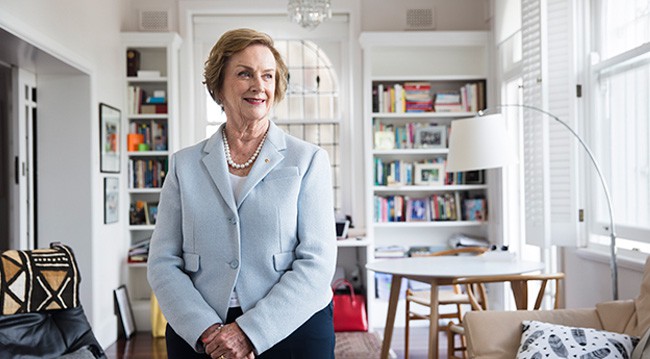Advance, a global community network, interviewed Wendy on why she continues to challenge the status quo and her hopes for the next generation of young women leaders.

“When Angelina Jolie recently announced that she’d had a preventative double masectomy, it was the perfect example of personal meeting political, Wendy McCarthy AO, Founder, McCarthy Mentoring, recently told a group of young Australians in New York.
An early advocate for women’s rights, especially reproductive rights, Wendy says that many of her political actions have been motivated by personal experiences.
We ask Wendy why she continues to challenge the status quo and her hopes for the next generation of young women leaders.
Throughout your career you’ve worked as an advocate, educator and change agent in Australia and internationally. When you look back, in what areas of social change do you feel you’ve been able to have the most meaningful impact?
Challenging the status quo in Australia in areas where social change was needed. My primary area of commitment and activism was around women’s rights, and especially reproductive rights. My original profession as a teacher enabled me to communicate effectively as I learned to become a community activist, initially in childbirth issues, and later for ten years in family planning.
What have been your key personal and professional motivators?
Enabling women to have access to education and to make choices in their lives. I was fortunate to have a great public education and access to university through scholarships, but I was part of a very small group of women in the 1950s and early sixties. My strong view is that education is the most important enabling gift and one that no one can take away from you. I want everyone to have it.
How do you maintain a global perspective? In particular, on issues that affect you on a personal level?
Having lived abroad for three years in the sixties I became a person who was/is always interested in being a global citizen. Since the mid seventies I have had a professional life with a global perspective in family planning, health promotion, higher education, women’s issues/rights, broadcasting and heritage and conservation. Travelling and exploring the world is an important part of my persona.
You’ve talked in the past about the reluctance of younger generations to advocate and organise for change (in particular in regards to women’s rights). Where do you think the gap is and where do you think there are opportunities to increase young people’s engagement with social issues?
Many young women believe that the world they live in is a world free of discrimination and they hate being seen as powerless. This means they often deny what is happening to their opportunities and pay packet in the workforce. They want to believe they can have it all and the feminist battles are over. They can have it all but not all at once and this means they need to think strategically about their lives and realise that some of the obstacles are not personal but cultural and that they cannot remove them without collective support. However, I feel optimistic about the capacity of young women to do this in their way.
What role models or kind of role models have you looked up to throughout your career?
People of integrity who know their values and are not afraid to express them. People who have been able to speak out about matters of concern to them and encourage others to join them in finding solutions; people who can manage change when it is needed.
Finally, what advice would you give to young leaders looking to bring about positive social change?
Find your passion. What matters to you? Can you change it? Imagine you are writing your own obituary. What will be your legacy? ”
Source: by Sofia Ridwan, CEO, Advance Global Community, 05 June 2013

